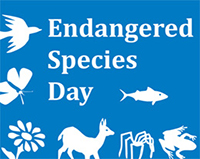 Most people do not have the pleasure of experiencing some of the world’s most iconic exotic animals first hand, let alone in the wild. I was fortunate enough to have numerous amazing experiences with many of these iconic animals while in South Africa. A most memorable experience, which I still think fondly of to this day, happened while I was camping in the bush in Kruger National Park. It was late at night and I was lying in my tent listening to the roars of lions all around me – everywhere and in every direction. It continued throughout the night! Come dawn, I woke up to more lion roars. I climbed out of my tent and walked past our circled barricade of vehicles and saw five lions nearby at a waterhole. It was amazing; something that I would have never dreamt I could experience.[teaserbreak]
Most people do not have the pleasure of experiencing some of the world’s most iconic exotic animals first hand, let alone in the wild. I was fortunate enough to have numerous amazing experiences with many of these iconic animals while in South Africa. A most memorable experience, which I still think fondly of to this day, happened while I was camping in the bush in Kruger National Park. It was late at night and I was lying in my tent listening to the roars of lions all around me – everywhere and in every direction. It continued throughout the night! Come dawn, I woke up to more lion roars. I climbed out of my tent and walked past our circled barricade of vehicles and saw five lions nearby at a waterhole. It was amazing; something that I would have never dreamt I could experience.[teaserbreak]
I, along with most people, instantly think of lions and other majestic, iconic animal species when we hear the term “endangered species.” Species like the giant panda, Asian elephant, tiger, African lion, and rhinoceros get the most attention and are the animals that people are most familiar with. But, what about the hundreds of lesser known endangered species (thousands if you include non-mammals)? In celebration of Endangered Species Day, we shine the spotlight on some of these lesser known species.
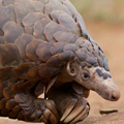 Have you heard of a pangolin? A small, scaly anteater native to Africa and Asia, and have been listed as endangered since June 1976. Pangolins are the world’s most illegally trafficked mammal. They are highly sought after for their valuable meat, scales, blood, and fetuses. Pangolin meat is a luxury product in China and Vietnam, while their parts are used in traditional Chinese medicine, with the belief being that they aide in a variety of ailments ranging from skin conditions to infertility.
Have you heard of a pangolin? A small, scaly anteater native to Africa and Asia, and have been listed as endangered since June 1976. Pangolins are the world’s most illegally trafficked mammal. They are highly sought after for their valuable meat, scales, blood, and fetuses. Pangolin meat is a luxury product in China and Vietnam, while their parts are used in traditional Chinese medicine, with the belief being that they aide in a variety of ailments ranging from skin conditions to infertility.
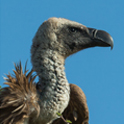 African vultures are another often overlooked endangered species. These birds are native to Africa and have been endangered for thirty years. Seven out of eleven African vulture species are listed as endangered or critically endangered. African vultures are prized for their body parts, which many believe aide in a variety of both physical and spiritual ailments.
African vultures are another often overlooked endangered species. These birds are native to Africa and have been endangered for thirty years. Seven out of eleven African vulture species are listed as endangered or critically endangered. African vultures are prized for their body parts, which many believe aide in a variety of both physical and spiritual ailments.
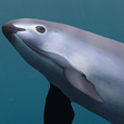 How about a vaquita? Have you heard about this small porpoise native to only the Gulf of California (Sea of Cortez)? They have been considered endangered since January 1985, but the species has experienced a drastic decline in recent years. In the fall of 2017, there were approximately thirty individual animals left in the world and, sadly, in as little as six months, this number may have fallen to approximately twelve individuals! The vaquita’s sharp decline is due to drowning from entanglement in illegal fishing nets set to catch the highly trafficked totoaba fish in Mexico.
How about a vaquita? Have you heard about this small porpoise native to only the Gulf of California (Sea of Cortez)? They have been considered endangered since January 1985, but the species has experienced a drastic decline in recent years. In the fall of 2017, there were approximately thirty individual animals left in the world and, sadly, in as little as six months, this number may have fallen to approximately twelve individuals! The vaquita’s sharp decline is due to drowning from entanglement in illegal fishing nets set to catch the highly trafficked totoaba fish in Mexico.
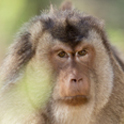 What about a pig-tailed macaque? Pig-tailed macaques are a species of monkey native to parts of Asia, which have been considered endangered for at least twenty years. The pig-tailed macaque’s endangerment is primarily due to habitat loss. Deforestation of their habitat is occurring at an alarming rate to allow for agriculture and farmland development.
What about a pig-tailed macaque? Pig-tailed macaques are a species of monkey native to parts of Asia, which have been considered endangered for at least twenty years. The pig-tailed macaque’s endangerment is primarily due to habitat loss. Deforestation of their habitat is occurring at an alarming rate to allow for agriculture and farmland development.
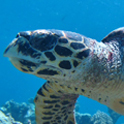 And finally, there are sea turtles. Sea turtles are native in all oceans, except the Polar Regions, and have been endangered since the 1970s. There are seven sea turtle species, of which five are endangered, due to poachers hunting them for their meat, skin, eggs, and shells.
And finally, there are sea turtles. Sea turtles are native in all oceans, except the Polar Regions, and have been endangered since the 1970s. There are seven sea turtle species, of which five are endangered, due to poachers hunting them for their meat, skin, eggs, and shells.
While I will never forget my experience with lions in Kruger National Park, I am mindful of the fact that each individual animal and species – even the ones that we do not hear about or read about – play a vital role in their ecosystems. This is why Born Free asks that you share this blog to help spread the word and create awareness for these lesser known endangered species! Look below for some sample social media posts you can use!
Keep Wildlife in the Wild,

P.S. And, be sure to check out the latest edition of Animal Issues Digest, our twice yearly magazine. This issue is dedicated to endangered species and includes an article by Congressman Ted Lieu about the importance of protecting wildlife!
Sample social media posts to help us spread the word:
In honor of #EndangeredSpeciesDay, learn about some #LesserKnownEndangeredSpecies with @BornFreeUSA! http://bit.ly/endangeredspeciesblog
In honor of Endangered Species Day, learn about some lesser known endangered species with Born Free USA! http://bit.ly/endangeredspeciesblog